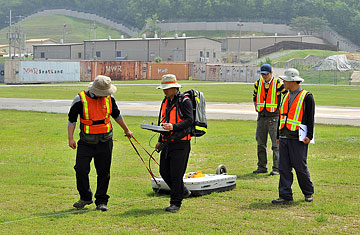
South Korean technicians conduct a ground-penetrating radar survey at Camp Carroll, a U.S. Army base near Waegwan, on June 2, 2011
(2 of 2)
Other Defense Department documents could shed some light on how even that small amount of dioxin got there. A significant number of herbicides and pesticides were buried at the base in 1978 and then excavated during the next two years, though Agent Orange is not listed among them, says an Army environmental survey from 1992. In an investigation in 2004, an Army contractor found safe levels of dioxins at the base, similarly dampening the possibility that Agent Orange drums were present.
Nevertheless, the controversy has revived deep-rooted suspicions that many South Koreans harbor against American military bases. While the governments of South Korea and the U.S. enjoy warm relations, many individual lawmakers and activists charge that American installations contribute disproportionately to pollution in surrounding communities, while shirking cleanup costs. In the past 20 years, American forces have committed 47 known cases of pollution, says Green Korea, a Seoul-based environmental group known for its crusades against the bases. Whether they are legally responsible for that pollution, however, is debated. The Status of Forces Agreement, a 1966 bilateral treaty that defines the legal rights and responsibilities of U.S. troops in South Korea, does not clearly stipulate that the U.S. military must completely clean up pollution and pay these costs, says Lee Jang-hee, a law professor at the Hankuk University of Foreign Studies.
But even activists say they were surprised at the about-face in the Army's public-affairs strategy after multiple pollution-related blunders in the past two decades, says Kim Hye-jin, a campaigner at Green Korea. The Defense Department formed a joint investigation team to look into House's allegations with government officials in uncharacteristic haste, and then kept the public informed by releasing old documents. "It was unusual that the commander of the 8th Army appeared so quickly on the radio," says Kim, referring to a broadcast on May 26 by Lieut. General John D. Johnson, the commander of all American troops in South Korea. But, she adds, "the statements are not sincere."
In earlier debacles, Kim says, the Army took a more opaque approach, slowly and reluctantly publicizing the results of investigations to allay outcries — a tactic that usually backfired when activists filled in the information vacuum with conspiracy theories. Those gaffes fueled protests against U.S. forces that climaxed in the early 2000s, a time when the U.S. appeared to be losing leverage in its South Korean military alliance. The most well-known calamity came in 2000, when a U.S. Army mortician ordered his South Korean assistant to pour 20 gal. (76 L) of formaldehyde, a cancer-causing compound used for preserving bodies, down the sink, leading it to flow through a major river in Seoul. Following widespread demonstrations, the mortician was tried and imprisoned for six months under South Korean law, even though an Army investigation declared the sink disposal to be within safe limits and following reasonable procedure. By the mid-2000s, the environment again became a sticky point when Washington handed over several military installations to Seoul, which petitioned the U.S. government to clean up high levels of soil pollution at the bases, to little avail.
In the past three years, amid tensions with North Korea, South Korean politics has taken a conservative swing in favor of the U.S. military presence. The Army's brisk and transparent response to House's allegations has helped calm contamination worries, but that isn't quelling fears for many elderly South Koreans who were exposed to heavy dioxin doses as conscripts in the DMZ and in the Vietnam War, or for today's post–Cold War youngsters who are usually more receptive to anti-American calls. Nonetheless, "it's hard to argue persuasively that the U.S. is trying to hide something," says Katharine Moon, a political-science professor at Wellesley College in Massachusetts.
And even though protests will likely continue, they aren't all arising from anti-Americanism. Rather, activism has gained popularity in South Korea because of political changes enacted in the mid-1990s, Moon says. Before that era, Seoul lawmakers handpicked mayors and governors, making them more likely to follow the capital's stance on Washington. Today, South Koreans elect their own local representatives, giving them a more popular mandate to maneuver against American bases and the national government. That's an asset, says Chang, the melon farmer, who's happy to have some voice in shaping the U.S.–South Korea military alliance, even if a small one.
